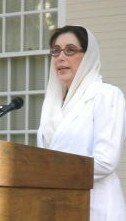Reverberations: Bhutto’s death hits home
 Charlottesville-based SNL Financial has an office in Islamabad, Pakistan, with about 120 employees, most of whom live in Rawalpindi, the city where Benazir Bhutto was shot and 20 of her followers killed when a suicide bomber blew himself up Thursday, December 27.
Charlottesville-based SNL Financial has an office in Islamabad, Pakistan, with about 120 employees, most of whom live in Rawalpindi, the city where Benazir Bhutto was shot and 20 of her followers killed when a suicide bomber blew himself up Thursday, December 27.
“There’s always some concern when there’s this kind of national trauma,” says SNL chairman and founder Reid Nagle of his company’s Pakistan operations.
“It’s like the lull before the storm,” says Saad Khatri, SNL’s mergers and acquisitions manager, who spoke to the Hook from Islamabad. Bonfires and clashes followed the assassination, but SNL employees got home safely, he says.
The majority of employees came to work today, but with gas stations closed and public transportation not running, he expected fewer to show up for the night shift. “It’s hard to push people to work in the evening when safety is affected,” he says.
The situation is worse in the southern part of Pakistan, where Bhutto drew more of her support and where Khatri’s family lives. “My family said more shops had been burned,” he says. Born and raised in Karachi, Khatri, 25, attended the same private school that Bhutto did.
“It’s a huge shock,” he says, particularly for Pakistanis who had a more liberal, western education, such as himself and the director of SNL Pakistan, UVA grad Muneeb Idrees.
 “I have never been a fan of Benazir,” Idrees says, but adds that he was “absolutely” surprised by her assassination, even after a failed attempt killed around 140 of her followers October 18, right after she returned to Pakistan. “I honestly didn’t think anyone could pull this off,” he says.
“I have never been a fan of Benazir,” Idrees says, but adds that he was “absolutely” surprised by her assassination, even after a failed attempt killed around 140 of her followers October 18, right after she returned to Pakistan. “I honestly didn’t think anyone could pull this off,” he says.
UVA fourth-year Alishba Kassim, 21, is another Pakistani who describes herself as a “not very ardent supporter” of Bhutto, but who says, “I’m very horrified at what happened.”
Kassim spoke to the Hook from Karachi, where her family lives. That city is the scene of “quite a lot of turmoil,” she says. Cars and commercial buildings, such as a McDonald’s, have been burned, and 200 banks have been burned or damaged.
“Bullets are being fired– I could hear them last night,” says Kassim. “People are horrified, and there’s been a large, violent outpouring– ” one that’s targeted property more than people so far.
Rick Sincere created a website to raise funds for Benazir Bhutto’s Pakistan Peoples Party and launched it December 26. By December 27, the popular, two-time prime minister was dead in the latest in a string of violent political turnovers that have plagued Pakistan since its 1947 partition from India.
“I was stunned, absolutely stunned,” says Sincere, who works as a consultant to Washington-based Scribe Strategies and Advisors (motto: “It’s not who you are, it’s who you know.”). “It’s one of those surreal experiences,” he adds.
Sincere met Bhutto four or five years ago in the Washington area in the home of one of her supporters. “She seemed so unassuming,” he recalls. “I was expecting to meet someone cold and imperious. Instead, I found someone very warm, very polite, who was willing to engage with us as equals. Because my expectations were so different, she seemed very genuine.”
One other detail Sincere remembers: how youthful Bhutto looked. “She seemed 33– and she was probably 49 then,” he says.
Little more than a year ago, on October 2, 2006, Bhutto was in Staunton to visit Mary Baldwin College, where she delivered her message of democracy. “She was a very popular speaker on the college circuit,” notes Sincere.
The University of Virginia has 34 Pakistani students, many of whom were at home when Bhutto was gunned down. “They’re distraught,” says UVA prof Rich Barnett, who teaches the only history of Pakistan course in the United States. “This represents another example of violent tactics having a powerful effect.”
South Asian students viewed Bhutto, 54, as “wearing several guises,” explains Barnett. “They know she was under indictment for serious corruption when in office– $1.5 billion salted away in collusion with her husband.”
The corruption charges were one of the reasons Bhutto was ousted from power. Of course, Barnett adds, “To say politicians are involved in corruption is like saying the sun is shining and the sky is blue.”
Even though she was exiled following two terms in office during which she “fell flat,” Barnett says, Bhutto continued to appeal. “We fell in love with her because of her charisma,” he says. “She has been the fair-haired candidate of the west because she speaks the language” and is Harvard- and Oxford-educated.
Bhutto was the most secular and the most pro-democracy candidate in a country roiled by religious extremism. And within her Pakistan Peoples Party, which hoped to gain seats in the upcoming January 8 elections, “There is no one to replace her,” says Barnett. “This is a major victory for Islamists.”
Barnett met Bhutto in 1993 when she was preparing to stand for her second term in office. “She looks right at you, which is very unfeminine in Pakistan,” he says. “She shook hands and was very relaxed talking to academics, very comfortable in her own skin.”
Bhutto’s death is a “severe blow for the future of democracy in Pakistan,” says UVA associate professor of politics John Echeverri-Gent.
But Omer Shaukat, 27, a UVA grad student in religious studies, disagrees. He thinks Bhutto “has been portrayed as a martyr for democracy, but a lot of Pakistanis remember her for corruption and people in her administration supporting the Taliban.”
He mentions a pro-democracy speech by Bhutto on the NPR website. “I want to emphasize a lot of Pakistanis saw through that rhetoric” he says, and believe Bhutto and General Pervez Musharraf had been working on deal to consolidate power.
“What’s going to happen to the democratic process in Pakistan is the biggest concern,” Shaukat says.
“This is a turning point,” SNL’s Idrees agrees. “This is when most Pakistanis decide which side they’re on.”
#











It’s not entirely accurate to say I “created a web site” to raise funds for the PPP. I was part of a team that did so. The team included my colleagues at Scribe Strategies & Advisors and at the political consulting firm, Aristotle International (www.aristotle.com).
That aside, the article accurately reflects my reaction to Mrs. Bhutto’s assassination.